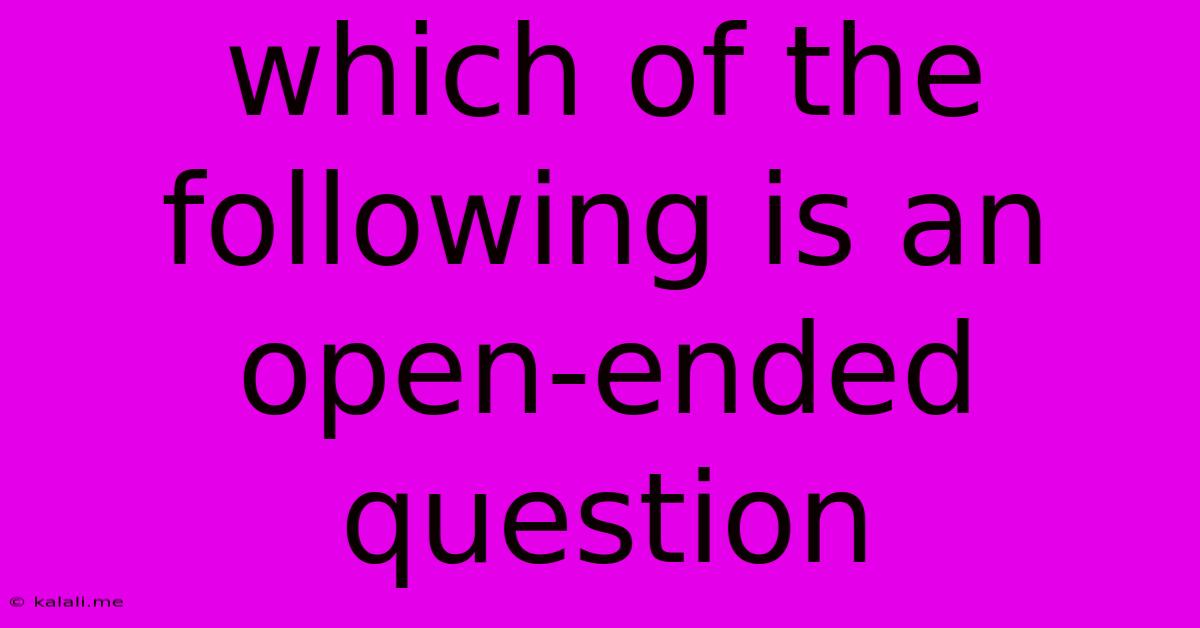Which Of The Following Is An Open-ended Question
Kalali
Jun 13, 2025 · 3 min read

Table of Contents
Which of the Following is an Open-Ended Question? A Guide to Asking Effective Questions
This article explores the nuances of open-ended questions, differentiating them from closed-ended questions and highlighting their importance in various contexts. We'll delve into examples, provide a clear definition, and explain why understanding this distinction is crucial for effective communication and research. This will help you identify open-ended questions, even within a multiple-choice setting.
What is an Open-Ended Question?
An open-ended question is a question designed to encourage a detailed answer using the respondent's own knowledge and feelings. It avoids simple "yes" or "no" answers and instead prompts a more thorough, expansive response. These questions are characterized by their flexibility and the freedom they give the respondent to express their thoughts completely. They are often used in qualitative research, interviews, and conversations where gaining in-depth understanding is crucial.
Closed-Ended vs. Open-Ended Questions: A Key Distinction
The opposite of an open-ended question is a closed-ended question. Closed-ended questions typically offer a limited number of responses, such as multiple choice options or a simple "yes" or "no." They are valuable for gathering specific data efficiently, but they often restrict the depth of information obtained.
Here's a table summarizing the key differences:
| Feature | Open-Ended Question | Closed-Ended Question |
|---|---|---|
| Response Type | Detailed, descriptive, expansive | Brief, limited, often one word or a simple choice |
| Answer Format | Free-form text, narrative, detailed explanation | Pre-defined options, "yes/no," multiple choice |
| Purpose | Explore in-depth understanding, gather qualitative data | Gather specific data efficiently, quantitative data |
| Example | "What are your thoughts on the new company policy?" | "Do you agree with the new company policy? (Yes/No)" |
Identifying Open-Ended Questions: Examples
Let's look at some examples to solidify our understanding:
Open-Ended Questions:
- "Describe your experience with our product."
- "What are your goals for the next year?"
- "How did you feel during that experience?"
- "What challenges did you face and how did you overcome them?"
- "Explain your reasoning behind that decision."
Closed-Ended Questions:
- "Did you enjoy the movie? (Yes/No)"
- "What is your age group? (18-24, 25-34, 35-44, etc.)"
- "Rate your satisfaction on a scale of 1 to 5."
- "Which product do you prefer? (A, B, or C)"
The Importance of Open-Ended Questions
Open-ended questions are invaluable for:
- Gathering rich qualitative data: They unlock detailed insights into opinions, experiences, and perspectives.
- Building rapport: They encourage open communication and trust between interviewer and respondent.
- Uncovering unexpected insights: They allow for the emergence of information that might not be anticipated through pre-defined questions.
- Understanding underlying reasons: They delve deeper than surface-level answers, revealing motivations and justifications.
- Improving customer service: Gathering detailed feedback helps companies tailor their products and services better.
Conclusion:
Understanding the difference between open-ended and closed-ended questions is crucial for effective communication and research. By learning to identify and utilize open-ended questions appropriately, you can gather richer, more insightful data, foster better relationships, and achieve more meaningful results in your interactions. Choosing the right type of question is key to obtaining the information you need effectively.
Latest Posts
Latest Posts
-
Four Bells Toll Together At 9am
Jun 14, 2025
-
Identify A True Statement About Theories
Jun 14, 2025
-
Which Of The Following Is True Of Voip
Jun 14, 2025
-
Branch Of Medicine Concerned With Digestive Diseases
Jun 14, 2025
-
112 Is 56 Of What Number
Jun 14, 2025
Related Post
Thank you for visiting our website which covers about Which Of The Following Is An Open-ended Question . We hope the information provided has been useful to you. Feel free to contact us if you have any questions or need further assistance. See you next time and don't miss to bookmark.